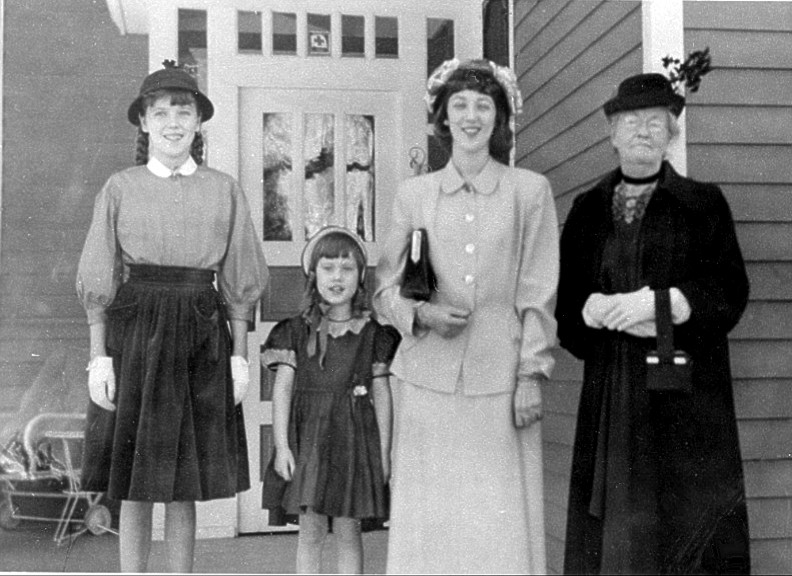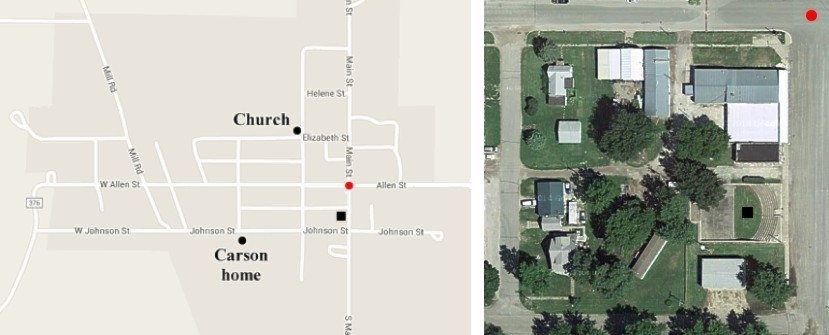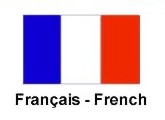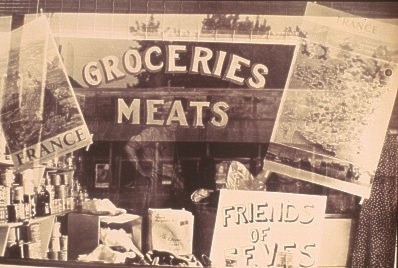A Grand Spectacle
But now that Morganville had that "interesting friend," to quote Carson's letter, how was it going to help? Morganville was not a rich community and it needed to let its new friend know that. Carson told McKee:
To get milk for Fèves meant [we must raise] money. We
were thrifty people who had been shy with our pocketbooks. We'd poured our milk by the gallon into our chicken and
pig troughs. [But] to rake up a hundred dollars in cash money to buy milk for distant strangers was an innovation.
Yet we couldn't be friends, couldn't feel equal with them until we had shared with them what we had.

(l-r) Carson's sister Nelda's girls Margretta and Monica, daughter Cynthia and mother Viola on the porch of the Carson home in Morganville
And how could they raise money - a dance, an ice cream
social?
It was already August when the idea of giving a pageant arose. The key suggestion came from Carson's mother. Viola
proposed telling the story of the founding and settling of Morganville, including the hardships that had been
endured. That way, while learning a bit about Morganville's history, the people of Fèves would know the people of
Morganville were not rich and also had to work hard.
In the end, it was decided to have all three - a dance, an ice cream social and a pageant - and more. There would also be
horse rides for the kids, games of penny pitch and someone to tell fortunes.
The precise date when the decision was made is not known, but it was almost certainly shortly before August 12 when the
following announcement appeared in the Morganville Tribune:
UNESCO Festival
There will be a festival sponsored by the UNESCO in the city Stadium in Morganville on Friday evening, August 27th. A historical pageant will be the highlight of the evening's entertainment. There will also be an ice cream social. After the program, there will be an old fashioned dance. O. W. Pierson's orchestra will furnish the music. Proceeds will go to pay expense of our adoption of a French town. Most of this expense will be to provide seed and milk for the children. The name of this town will be announced during the evening.

Left: modern map of Morganville with the location of the Methodist church, then as now. The Carson home location is also marked, but the house was moved in the 1980s. Mill Road was where the two railroads passed through the village in 1948. The red spot is at the intersection of Main and Allen streets, while the black square identifies the location of the Stadium mentioned in the Tribune article; right: satellite image with the red spot and black square at the same locations as in the map at the left. The Stadium seating is on the right (the curved area), the stage is on the left, with a grassy area between.
The last sentence of the newspaper article would seem
to imply that the village adopted was a secret to be revealed at the pageant. If that was the intention, the
selection would not have remained a mystery long in such a small town, where all the committee members knew the result of
the voting.
McKee asked Carson if there weren't some who were not in favor of what the village was doing. She answered:
Yes. Some said, "we've got troubles of our own, got poor right here in Clay Center," and we'd answer, "They've got relief agencies to turn to; over in Fèves they got nothing." And there were some who thought the thing was going to our heads. "So you're getting a nice bit of prominence out of your newest racket, eh? What's your tiny town going to do with all this publicity?" But we just went right on working.
The task that lay ahead was a daunting one. Carson had
written plays before and so was familiar with the process. But much of what she knew did not apply. Normally, when
the writing was largely complete, staging, costuming and adding music would follow. Rehearsals would reveal problems
and rewrites would occur.
But there was no time for such an approach. In something less than three weeks, Carson had to write a complete play.
The costuming would have to be done with what could be found in the closets and attics of Morganville's citizens.
Young would have to pull together musicians and begin practicing pieces before the script was complete. So
tasks that would normally be done sequentially would instead have to be completed in parallel.
The two Velmas had the advantage of knowing the play was to show a connection between their village and the greater
world. So almost any costume from any part of the world could be used. Many of Morganville's families were only one
or two generations removed from Europe. That meant that dresses or hats from these places that had belonged to
parents or grandparents and had been kept as family heirlooms were readily available. Carson described the process
to McKee:
We went to the spare-room closet, found the Spanish dress some
daughter had worn for dancing lessons, the kimono some missionary brought back from China, the hat from Mexico,
and the smock and fur muffs from Russia, and we put them all out on the [Carson] spare-room bed to decide
who they might fit best and then called them up. And there were the souvenirs the boys brought back - in getting
ready for the hula-hula dance, we were stunned to find that nearly every GI from the Pacific had brought back a
grass skirt!
Oetinger Brothers' grocery store window
With time short, Carson decided to go with something familiar. She fit the words of her play to the meter of Henry Wadsworth
Longfellow's "The Song of Hiawatha," a poem that was a staple in early 20th-century schoolrooms across America. Her original
script would grow to more than 4,500 words.
To encourage attendance, it was decided that the play would be free. Empty milk cans would be placed near the Stadium
and people were asked to donate whatever they wanted. A photographer would come early and take pictures of the costumed
actors and actresses. The hope was that these could then be sold to the performers and their families to raise additional
money.
But as time passed and the excitement grew, more and more people wanted to be involved. Carson had assumed 30 performers
would take part, but the number grew to 150 as people from the surrounding farms became involved.
At some point, Carson took a break from the script to send a note to Todd:
What evidence have you that these thrifty French
are not just using us? We are kind and generous, but we have to be sure. ... We are advertising all over the county.
We are going to have a photographer here to take pictures to sell to the "stars" of the show. The first baby born in
Morganville will be on stage. He's seventy-five!


